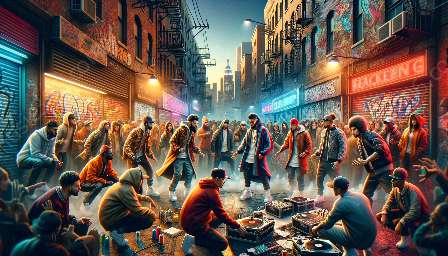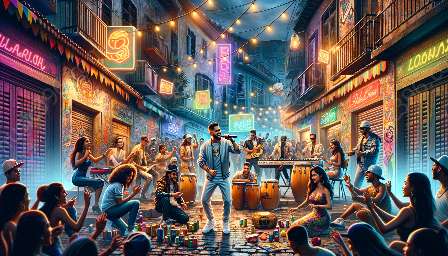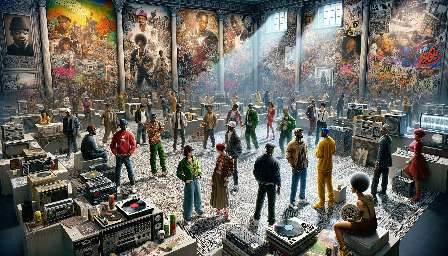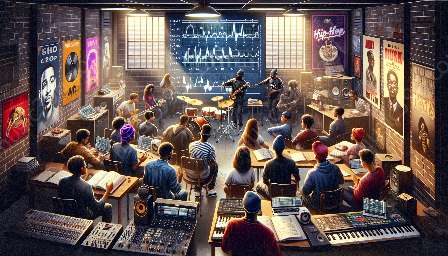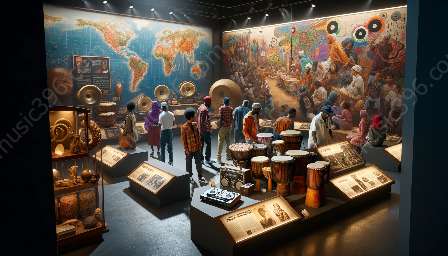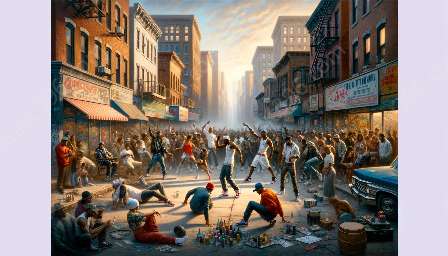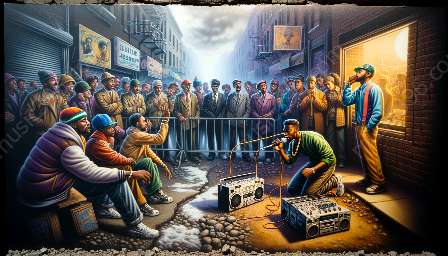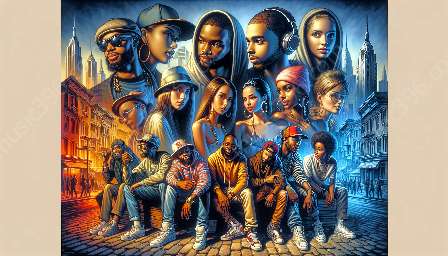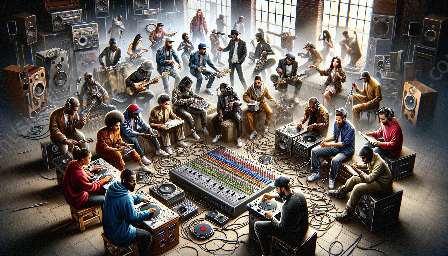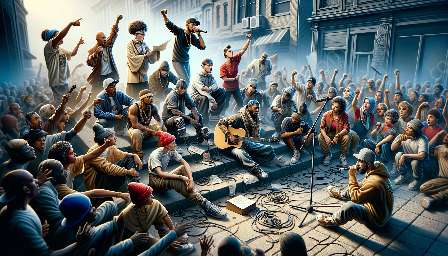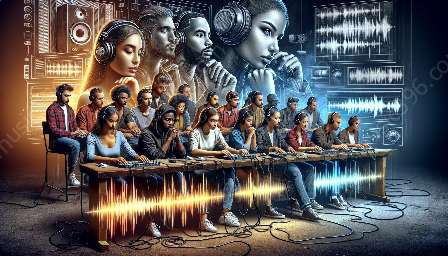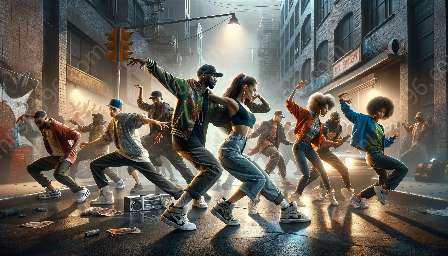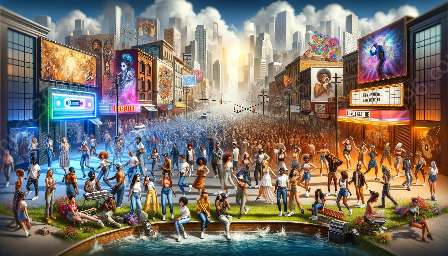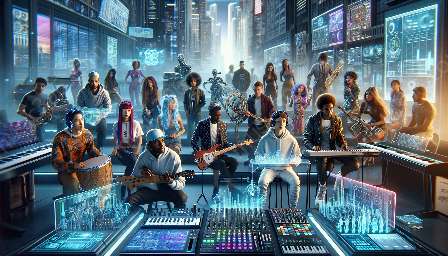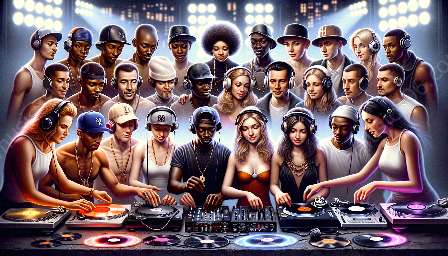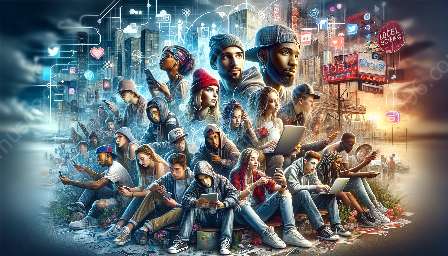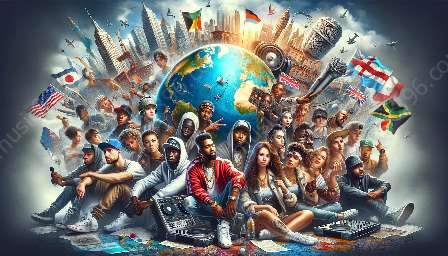Hip-hop music has been a powerful vehicle for expressing social issues and reflecting movements in urban communities. Through linguistic analysis of hip-hop lyrics, we can delve into the intricate ways in which these lyrics capture the voice of the streets and shed light on the realities faced by those living in urban environments. This exploration encompasses the intersection of urban culture and hip-hop and the impact of hip-hop on social change.
The Origins of Hip-Hop and Its Connection to Urban Communities
Hip-hop originated in the Bronx, New York, in the 1970s, against the backdrop of socio-economic challenges faced by urban communities. The music and its lyrics served as an outlet for marginalized voices to express their experiences, struggles, and aspirations. Hip-hop became a means of storytelling, empowerment, and protest, deeply rooted in the urban landscape.
Linguistic Analysis of Hip-Hop Lyrics
When conducting a linguistic analysis of hip-hop lyrics, it is essential to consider the use of language, dialects, slang, and storytelling techniques. These lyrics often reflect the vernacular and lived experiences of those in urban communities, providing a raw and authentic representation of their realities. Hip-hop artists carefully craft their lyrics to convey messages of social justice, inequality, empowerment, and resistance.
Language and Vernacular
Hip-hop lyrics are rich with linguistic diversity, incorporating elements of African American English, urban slang, and regional dialects. This linguistic fusion creates a unique form of expression that resonates with urban audiences and serves as a reflection of their cultural identity and experiences. The use of language in hip-hop lyrics is a testament to the power of words in conveying social narratives and connecting with listeners on a personal level.
Storytelling and Authenticity
One of the defining features of hip-hop lyrics is the art of storytelling. Artists use their lyrical prowess to narrate the realities of urban life, addressing issues such as poverty, violence, systemic oppression, and community resilience. Through vivid descriptions and compelling narratives, hip-hop lyrics offer a window into the lived experiences of individuals in urban communities, creating a sense of authenticity and relatability.
Social and Political Commentary
Many hip-hop songs serve as platforms for social and political commentary, addressing systemic injustices, racial discrimination, police brutality, and the impact of urban poverty. Through their lyrics, artists voice their perspectives on these pressing issues, sparking meaningful conversations and advocating for change within urban communities. Hip-hop becomes a vehicle for amplifying the voices of marginalized populations and challenging societal norms.
Urban Culture and Hip-Hop
The relationship between hip-hop and urban culture is symbiotic, as the music and its accompanying elements have become intertwined with the fabric of urban communities. From graffiti art and breakdancing to fashion and language, hip-hop has left an indelible mark on urban culture, shaping its aesthetics and social dynamics. As a result, hip-hop lyrics serve as a mirror reflecting the triumphs, struggles, and evolution of urban communities.
Empowerment and Identity
For many individuals in urban environments, hip-hop serves as a source of empowerment and a form of cultural identity. The lyrics not only resonate with their experiences but also provide a platform for self-expression and representation. Hip-hop culture fosters a sense of community and belonging, offering a space for individuals to voice their perspectives and celebrate their resilience in the face of adversity.
Social Change and Movements
At its core, hip-hop has been a catalyst for social change within urban communities. Through its lyrics, the genre has amplified the voices of activists, spoken out against social injustices, and mobilized movements for equality and justice. From the civil rights era to contemporary movements like Black Lives Matter, hip-hop lyrics have served as anthems of resistance and solidarity, uniting communities in the fight for positive change.
Impact of Hip-Hop on Social Change
The influence of hip-hop on social change cannot be overstated. Beyond serving as a reflection of urban realities, hip-hop has actively contributed to shaping societal conversations and catalyzing movements for progress. Its ability to galvanize communities, challenge power structures, and promote awareness has made it a potent force for driving meaningful social change in urban environments.
Cultural Critique and Awareness
Through poignant lyrics and evocative imagery, hip-hop acts as a cultural critique, shedding light on the socio-economic disparities, political struggles, and institutional barriers faced by urban communities. By raising awareness and provoking thought, hip-hop lyrics prompt listeners to examine the systemic issues affecting their neighborhoods and advocate for transformative action.
Community Empowerment and Resilience
Hip-hop lyrics often encapsulate the resilience and determination of urban communities in the face of adversity. They serve as rallying cries for empowerment, encouraging individuals to take pride in their heritage, organize for change, and drive positive transformation within their neighborhoods. The music becomes a unifying force that amplifies the agency and strength of urban residents.
Intersecting Global Movements
As hip-hop continues to permeate global cultural landscapes, its lyrics have become a unifying force for urban communities worldwide. With the rise of transnational movements and solidarity among marginalized populations, hip-hop serves as a bridge, fostering connections and solidarity across diverse urban contexts. The themes and messages embedded in hip-hop lyrics resonate with individuals facing similar social issues, transcending geographical boundaries.
Conclusion
The relationship between hip-hop lyrics and social issues in urban communities is profound and multi-faceted. Through linguistic analysis, we gain insight into the power of hip-hop as a form of cultural expression, social critique, and catalyst for change. The intersection of urban culture and hip-hop provides a platform for amplifying voices, fostering solidarity, and advocating for meaningful transformation. As we continue to dissect hip-hop lyrics, we recognize their role in reflecting and shaping the narratives of urban communities, reaffirming the enduring impact of the genre on social movements and progress.

